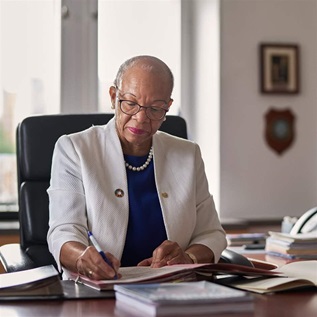The Pew Center for Arts & Heritage Announces 2011 Heritage Philadelphia Program Grant Recipients
The Pew Center for Arts & Heritage has awarded over $1 million through Heritage Philadelphia Program (HPP) to seven organizations, the largest amount in HPP's 13-year history. The 2011 funded projects include a writing workshop in which veterans and military families will take inspiration from historical documents, rarely seen by the public, which speak to the personal toll of war; a community- and conversation-focused, multimedia installation about slavery at Cliveden, the 18th-century home of the Chew family; a reimagining of Penn Museum's Africa Gallery, determined by feedback from Penn's own visitors; plus, an environmentally conscious greenhouse, a history-focused treasure hunt, culinary podcasts and more at one of the nation's most venerable historical institutions.
HPP's grants for these projects will support interpretation and preservation work that promotes new and inventive ways for a variety of communities to interact with historical sites and artifacts, emphasizing the relevance of history to contemporary life and issues.
HPP director Bill Adair stated, “These grants demonstrate the bold and imaginative approaches to history that audiences expect in the 21st century. We are excited to support such adventurous programming and projects that are not afraid to tackle tough subjects.”
The Rosenbach Museum and Library will launch Families Affected by War, Then & Now, a program for veterans of the Iraq and Afghanistan wars and their families. Participants will take part in a two-month writing workshop and will have the unique opportunity to handle documents from the Rosenbach's extensive collection, then write creative work reflecting their own experiences. These historical materials, not generally available for public use, speak to the personal experience and turmoil of war, such as a letter from Ulysses S. Grant to his sister and touching correspondence between a WWI soldier and his mother. The workshop—planned by historians, psychologists, social workers, and writers—will result in participants' written work featured in an exhibition alongside objects from the museum's collection, with a publication to follow.
Cliveden of the National Trust will implement Emancipating Cliveden, a radical reinterpretation of the historic former home of the Chews, who enjoyed a prosperous lifestyle built on the wealth gained from their slaveholdings. This transformation will address the effects and ramifications of this history, informed by extensive community engagement and discussions over the past year, as well as primary documents from the Chew estate. Emancipating Cliveden will culminate in an immersive, thought-provoking multimedia installation for visitors and an ongoing series of public conversations on slavery and race—all intended to give a fuller picture of Cliveden's story and to reflect upon difficult yet omnipresent themes in U.S. history.
Penn Museum's Africa Gallery will receive a major overhaul from a year-long planning initiative, Imagine Africa @ Penn Museum. Visitors will be asked for feedback on a gallery installation of rotating objects and images from Penn's vast collection; that interaction will then play a pivotal role in how the museum reshapes its permanent African exhibit. Penn will reach out to new audiences, especially the African and African-American communities in West Philadelphia, and gauge their interests and perspectives on specific themes. The museum will also partner with local organizations such as the Clay Studio, Rennie Harris Puremovement, and West Philadelphia Arts Connect for a series of on- and off-site workshops, performances, and other free public events.
The American Philosophical Society Museum will launch The Greenhouse Projects, five large-scale public programs in the fall of 2011. Among these projects will be a striking greenhouse designed by 2010 Pew Fellow and architect Jenny Sabin, constructed from recycled materials; an outdoor play by director/designer/playwright Aaron Cromie, to be performed at the 2011 Philly Fringe Festival; a treasure hunt in which participants will use GPS coordinates and clues to hunt for items at historical sites around Philadelphia; and a series of podcasts on French cuisine by food journalist and radio producer Lari Robling.
For the complete list of 2011 Heritage Philadelphia Program grant recipients and full project descriptions, please see the attached list or visit www.pcah.us/heritage.
Heritage Philadelphia Program's 2011 grant proposals were evaluated by a panel of experts, recognized for their leadership in areas of historical interpretation, preservation, and community engagement. Their job is to select those projects that demonstrate innovation and excellence in public history practice, and which involve exceptional audience-centered programming. For a full list of panelist names and respective credentials, please see the attached list or visit www.pcah.us/heritage.
Established in 1998, the Heritage Philadelphia Program has made a total of 114 grants through this competitive process, investing over $9 million in history projects in the five-county region of Southeastern Pennsylvania.











